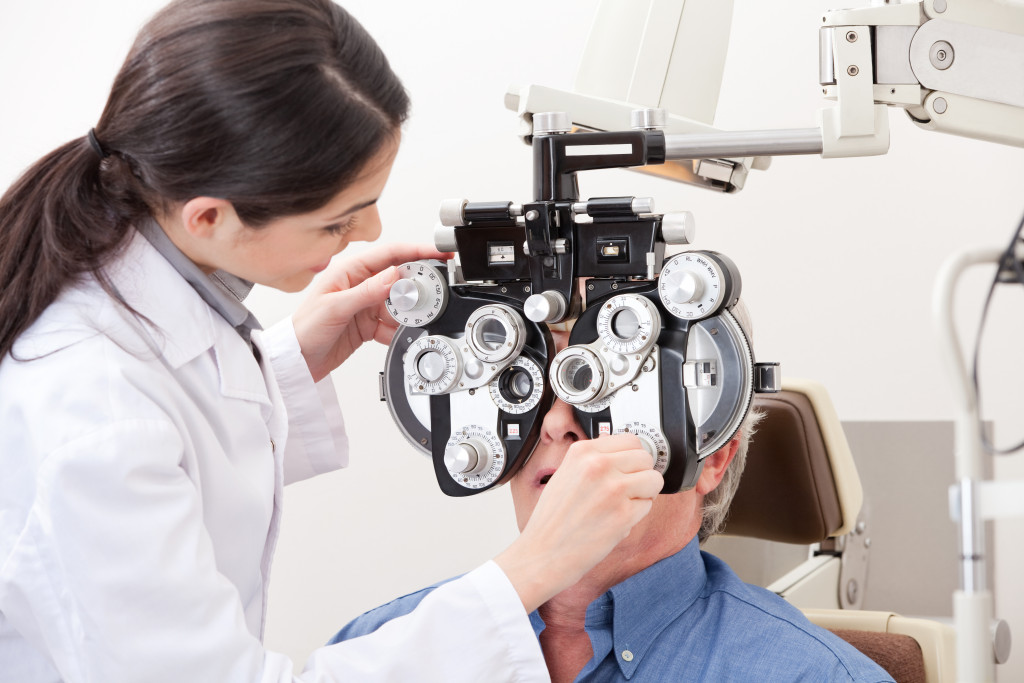- To prescribe the correct treatment, you need to identify the cause of the infection.
- For an accurate diagnosis and treatment plan, it is recommended that you see a reliable optometrist.
- To avoid contracting infections, wearing protective eye gear while engaging in certain activities, as outlined in the doctor’s treatment plan, is important. Please follow the instructions provided.
- To prevent infection, it’s crucial to perform proper cleaning and disinfection of your contact lenses.
Eye infections can be uncomfortable and irritating, so taking the necessary steps to ensure your eyes remain healthy is important. The key is to identify the cause of the infection to treat it correctly.
Depending on the type of infection, there are different things you should consider when dealing with it. By being aware of potential causes and preventive measures for eye infections, you can all work towards keeping your eyes healthy and comfortable!
Determine the cause of the infection.
Determining the cause of an infection is vital for effective treatment. When combating eye infections, it is crucial to identify the root cause to administer the correct medication. Misdiagnosis delays the healing process and can exacerbate the condition, causing it to spread to other areas of the eye or even result in vision damage.
It is important to analyze the symptoms, such as redness, pain, and discharge. This will help determine whether the infection is bacterial, viral, or fungal. Armed with this information, the correct course of treatment can be prescribed. Proper diagnosis saves not only time, money, and energy but may also potentially save vision.
Consult with a reputable optometrist.

Consulting with a reputable optometrist is crucial when dealing with eye infections. It is important to note that self-diagnosing and self-treatment can lead to serious consequences such as permanent vision loss or blindness.
An optometrist’s expertise in diagnosing and treating eye infections is the safest and most effective way to ensure proper healing. Optometrists will perform the necessary tests and assessments to identify the root cause of the infection and prescribe the appropriate medication and treatment.
Optometrists will also educate patients on proper hygiene practices and prevention measures to minimize the risk of future infections. Seeking professional help from a reputable optometrist is the best way to safeguard the health of one’s eyes.
Follow your doctor’s treatment plan.
Following your doctor’s treatment plan is crucial to managing eye infections and preventing them in the first place. Here are some tips on how to do this:
Wear eye protection.
Wearing eye protection such as goggles is crucial when participating in activities that can cause eye infections. It is not uncommon for swimmers dealing with eye infections to hit the pool without any eye protection, but this can worsen their condition.
Wearing goggles keeps harmful bacteria from entering the eyes and reduces the risk of getting re-infected from the water. As an expert in eye safety, it is important to stress the significance of properly wearing goggles to prevent further damage to the eyes.
Clean and disinfect contact lenses.

Properly cleaning and disinfecting contact lenses is essential for maintaining good eye health. Not only does it remove dirt and debris, but it also reduces the risk of infections caused by bacteria and other harmful microorganisms. When dealing with eye infections, taking the necessary precautions in handling and cleaning contact lenses is critical in preventing further complications.
By following proper cleaning and disinfection guidelines, contact lens wearers can help safeguard themselves against infections and other eye-related issues. Whether using a solution or a prescribed disinfectant, taking these extra measures ensures that your contact lenses are free of harmful pathogens that can cause discomfort and potentially harm your eyes.
Take the medication prescribed by your doctor.
When taking medication prescribed by a doctor to treat an eye infection, it is crucial to follow the instructions carefully. By doing so, patients can ensure they receive the maximum benefits of the medication while minimizing the risk of side effects.
This process begins with reading the medication label and any accompanying instructions provided by the doctor, which will outline the dosage, frequency, and duration of treatment. Patients should take the medication as directed, at the same time each day if possible, and alert their doctor if they experience any side effects or changes in symptoms. Proper medication management, patients can speed up the healing process and restore their eye health.
Use artificial tears.
Proper use of artificial tears can be a helpful tool in soothing eyes and reducing irritation caused by eye infections. These over-the-counter eye drops work by adding moisture to the eyes, which can provide a sense of relief from dryness, redness, and overall discomfort. While artificial tears may not cure an eye infection, they can help alleviate the symptoms and improve overall eye health.
Not all artificial tears are created equal, and some may contain preservatives that can further irritate sensitive eyes. Consult with a healthcare provider or optometrist to determine the best type of artificial tears for your specific needs. Artificial tears can benefit your eye health routine when used correctly and as directed.
These are just a few ways to maintain good eye health and combat infections. Everyone can work together to maintain healthy and comfortable eyes by learning about possible causes, preventive measures, and appropriate treatment plans.